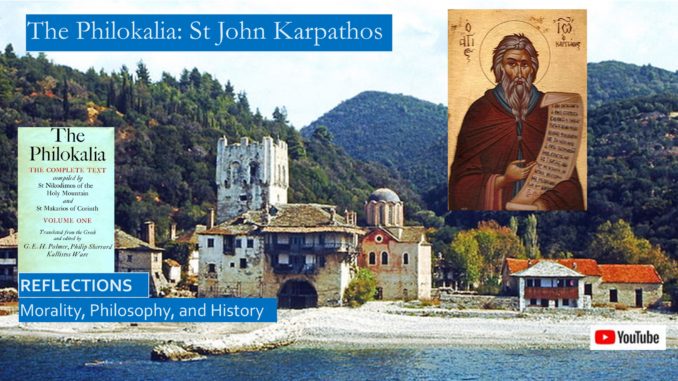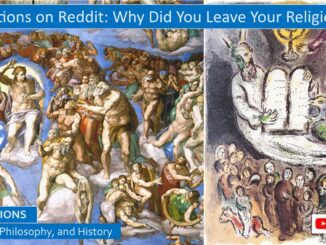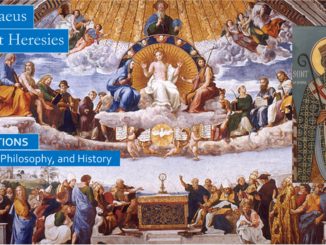
St John of Karpathos encourages us to persevere in the spiritual life. When we stumble on the rocky path, when we skin our knees on the hard rocks, we should seek the hand of the Lord to pull us back up again. When we allow evil thoughts to roam about in our consciousness, for a time we forget grace, we distance ourselves from God, but that is when we should make every effort to seek God, so we are not deprived of the grace of God. St John of Karpathos tells us that “lifted by the wings of the Spirit and freed from the weight of my body, I was able to soar above he predatory demons,” those demons who care not for our soul, those demons who seduce us with the pleasures of this world. (#5)
As the moon wanes, so we succumb to temptation; as the moon waxes, as the moon brightens, so through repentance “man regain his true splendor.” “The man who believes in Christ, ‘even though he dies, he shall live.’ ” (John 11:25, #4)
YouTube video: https://youtu.be/lU510yXDFFg
Christ has come to deliver us from the land of Egypt, from our passions, delivers us “from the destructive and sinful impulses of soul and body.” What is demanded of us? That we not grow listless, that we cling to the Lord with prayer, that we cling to the Lord with hope that perseveres, with hope that is unashamed.(#6) That in thankfulness we praise God, for when we “praise God in simplicity of heart we overthrow and destroy the schemes of the enemy.”(#7) That we pray, for “the enemy knows prayer is our invincible weapon against him, and so he tries to keep us from praying.”(#13)
The Church Fathers teach us to practice self-discipline, to reinforce good habits that draw us closer to God, to avoid bad habits that lead us to stray away from God. The soul must “endure with fortitude every tribulation, whether inflicted by men or by demons. . . Our sufferings are no more than we deserve, and we should never blame anyone but ourselves.”(#21) Our virtue is increased by “fear of God, attentiveness, constant meditation on the words of Scripture, and arming ourselves with prayer.”(#20)
Our virtue is also destroyed by mockery and idle talk.(#20) “Lovers of slander and gossip shut themselves out from the kingdom of heaven. St John of Karpathos provides us examples from Scripture. “A single good word made the thief pure and holy, despite all his previous crimes, and brought him into Paradise, whereas a single ill-advised word prevented Moses from entering the Promised Land. (#90)
When we fall, we should always get back on our feet, we must persevere. “When someone is defeated after offering stiff resistance, he should not give up in despair; let him take heart.”(#29) What should a dieter do when they are tempted and heartily and gluttonously in a moment of weakness? Get back on the diet. The best diet of all is not to go on a diet, as all diets end, but to instead change how you eat for the rest of your life, to change your lifestyle. This is very much the advice the Church Father offer, to change our lives, to develop better habits, to persist after a momentary fall. That is why in the Eastern Divine Liturgy the faithful pray, Lord, let us keep this day without sin, not this week, not this month, not this year, but we only pray that today will be a day without sin, for tomorrow is another day, another struggle. The past is gone, but we live today, for today is the first day of the rest of our lives.
How do we defeat the enemy, the demons who tempt us to stray from the spiritual life? Through unceasing prayer (#50), “the recitation of psalms and the keeping of vigils, humility, service to others and acts of compassion, thankfulness, and attentive listening to Scripture.”(#51) The demons fear our prayers, as St John of Karpathos teaches, “fire makes iron impossible to touch, as frequent prayer renders the intellect more forceful in its warfare against the enemy. That is why the demons strive with all their strength to make us slothful in attentiveness to prayer, for they know that prayer is the intellect’s invincible weapon against them.”(#77)
We who are not monks cannot often keep vigils, although Catholics often keep vigil through the adoration of the Eucharist. As laymen, we should not neglect attending the Mass or Divine Liturgy, and we should attend as many Holy Week and Lenten services as we can. We shouldn’t skip services during vacation, do we expect God and our guardian angels to take a vacation also, or do we especially want their protection during our travels? When we are careless what we watch on television and the movies, are we not abandoning our daily vigil, when we should remember our Lord?
How do we know that we truly Love God with all of our heart and with all of our soul and with all of our mind and with all of our strength, how do we know truly that we love our neighbor as ourselves? This is a question we must ask ourselves every day, as we must repent every day for how we fall short of the glory of God each day, but we can begin by asking, what activity do we schedule the rest of our free time around, particularly on the weekends? If the Mass and Divine Liturgy is the most important activity on our schedules, then the rest of our lives scheduled around church, but if sports or dancing or the beach is the most important, then everything else, church included, must get in line for our attention.
Perhaps we do hold a daily vigil, a most sinister vigil, when our daily lives after school and work revolve around an idiot box, or perhaps the Church Fathers would call it a demon box, a demonic influence that caters to our basest instincts, encourages our basest prejudices, which teaches our children not to respect our parents, which teaches all of us not to respect authority, which feeds our selfish lusts and our basest selfish desires, which confuses love and lust, which encourages us ceaselessly to spend, spend, spend!
Likewise, we should choose our close friends with care. As St John of the Cross teaches, our close friends whose friendship increases in us our Love for God. St John of Karpathos teaches us to “never form a close friendship with someone who enjoys noisy and drunken feasts, or who likes telling dirty stories. . . Do not let his filth defile you; do not fall under the influence of people who are unclean and uncircumcised in heart.”(#61) Likewise, we should not “spend time with someone who is sloppy, a mischief maker,” someone “who cannot control his tongue, who is quarrelsome and full of agitation inwardly or outwardly,” lest “you will be infected with his leprosy and be destroyed.”(#88)
When we refuse to repent, we are held “fast with bonds we cannot break, and the desires which drive us to our own destruction are fiercer and more vehement.”(#57)
St John of Karpathos teaches, “it is more serious to lose hope than to sin.” Where there is love, there is hope, faith, hope, and love are intertwined. St John of Karpathos compared Judas, who slung the silver at the feet of the high priest then hung himself in despair, to Peter, who repented though he denied Christ three times before the cock crowed. “Although Peter was brought down by a terrible fall, yet because of his experience in spiritual warfare he was not broken by despair, but leaping up he shed bitter tears form a contrite and humiliated heart.”(#85)
We will end our discourse as St John of Karpathos ends his teaching, “If, as St John says, ‘God is Love,’ then ‘he who dwells in love dwells in God, and God in him.’ (1 John 4:16) But he who hates his neighbor is separated from Love, and he who hates his brother is separated from God.” (#100)[1]
[1] St John of Karpathos, “For the Encouragement of the Monks in India who had Written to Him, One Hundred Texts” In the Philokalia, The Complete Text, compiled by St Nikodimos of the Holy Mountain and St Makarios of Corinth, Vol. 1, translated and edited by GEH Palmer, Phillip Sherrard, and Kallistos Ware (London: Faber and Faber, 1979), pp 298-321.







Be the first to comment